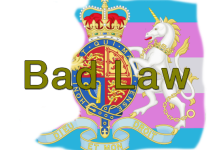Open letter to Gillian Keegan, Secretary of State for Education
Advice to schools on addressing gender identity issues
Dear Gillian Keegan,
I am writing to you on behalf of the Lesbian Rights Alliance, and as a parent who has relatives attending school.
Concerns
We are very concerned that you are considering allowing children to ‘socially transition’ and use different pronouns from their biological sex, provided they have parental permission.
This approach contradicts the advice from the Cass Review, which states that schools should not support social transitioning, as if left alone these children often change their minds about identifying as ‘transgender.’
Schools which promote gender identity doctrine as fact may also become involved in ‘lesbian and gay conversion therapy,’ by telling children they have been born in the wrong body and referring them to the GIDs clinics for medical intervention.
In addition, such referrals can be applied to children who are on the autistic spectrum and who do not understand the differences between biological sex and gender.
Regarding parental consent, some parents may agree to supporting a child’s change of identity, in the mistaken belief that this will help their child.
Very worryingly, the Policy Exchange report – Asleep at the Wheel: An examination of Gender and Safeguarding in Schools – found that 72% of secondary schools teach that a child can be born in the wrong body, and that 69% require other children to accept this change of identity and to use their new pronouns.
Further, as the Minister for Women and Equalities, Kemi Badenoch, has pointed out in her letter to the Ofsted Chief Inspector, allowing teachers to promote such contested beliefs about gender identity as fact, indicates a breach in the political impartiality law that schools are required to conform to in Articles 406 and 407 of the Education Act 1997.
Kemi Badenoch also recognizes in her letter, that the promotion of such beliefs on gender identity doctrine as fact, indicates “gross breaches of existing legislation whether of Equality law, safeguarding guidance or their impartiality duty.”
You may not be aware, but since the mainstreaming of the teaching of gender identity doctrine in school education, statistics from the GIDs clinics have shown that there has been a massive increase in the referrals of children for medical intervention, with over 5000 children being referred in 2021/22. These statistics apply specifically to girls who form at least two thirds of the referrals Moreover, a large number of referrals included children on the autistic spectrum, (Hannah Barnes, Time to Think 2023)
Changes to advice to schools
Your advice needs to recognize that it is not discriminatory or unlawful for schools to have sex-based rules. This includes the sex-based use of language. For example, it is not discriminatory to refuse to refer to a girl who might identify as a boy as ‘He’. The child is a girl and it is not direct discrimination to continue to call her a girl.
Moreover, as pointed out by the ‘Sex Matters’ Group, every child recorded on the school roll is recorded on the basis of their sex. Their sex is important to know when applying sex-based school rules, as laid down in the Equality Act 2010. Schools are required to have single sex toilets, for children aged 8 and above, changing rooms and accommodation on school trips.as well as single sex sports, where applicable.
Safeguarding
Knowing a child’s sex is key to safeguarding children, for example through providing single sex toilet facilities for girls and protecting their right to privacy when menstruating. However, the disturbing findings in the recent Policy Exchange report on secondary schools found that 28% did not have single sex toilets, 19% did not provide single sex changing rooms and 60% had mixed sex sports. All of these deviations from the law contribute to a lack of safeguarding and have resulted in sexual assaults by boys on girls forced to use mixed sex toilet facilities, as has happened in two Essex schools.
We welcome the report ‘Sexual Harassment and Abuse of Female Students and Staff – A Serious Problem in Education’ from the Women and Equalities Committee published today (5.7.2023) and the recommendations that schools and colleges should be funded to end the sexual harassment of girls and young women. However, unless the government can provide funding for single sex toilet facilities, in schools that do not have them, or order these schools to change their policies to provide these facilities, we fear that such sexual harassment will continue. We are aware that the Prime Minister has been sent a letter from 5 girls who do not have access to single sex toilet facilities or single sex changing rooms in their schools and that this is a real problem for many girls who are in schools where such facilities are not available. In this situation sexual harassment of girls is likely to continue.
Further, we understand that you have been sent an open letter from 2 teenage girls aged 14 about the teaching of gender identity doctrine as fact in their schools, and the failure of teaching staff to recognize or allow any critique from students who do not agree with these facts. These girls have indicated that they are too afraid to speak out about this, as when it has happened, they are bullied and ostracized by other students and been reprimanded for referring to biological sex.
The impact on primary schools
We think it is important to address the impact of teaching gender identity doctrine in primary schools and early years education, in regard to safeguarding. This is outlined in a Spectator article by Joanna Williams (https://www.spectator.co.uk/article/the-truth-about-trans-teaching-in-schools/ Many schools tell year 4 children aged 7/8 that they must understand different ‘genders,’ as well as various different sexual practices such as what ‘pansexual’ means. The article points out that girls in particular are negatively impacted by the sexist teaching of gender identity ideology and confusingly, get defined as ‘transgender’ if they do not conform to sexist stereotypes.
Ignoring guidance
You will probably be aware that the DFE issued non-statutory planning guidance to schools on the teaching of LGBT issues as part of the new Sex and Relationships curriculum in 2020. However, most of this guidance has been ignored by many schools. Two important issues apply in this regard.
Firstly, when teaching topics involving gender and biological sex the guidance states that schools “should not reinforce harmful stereotypes, for instance by suggesting that children might be a different gender based on their personality and interests or the clothes they prefer to wear. Resources used in teaching about this topic must be age-appropriate and evidence -based”
Secondly, schools should not work with companies that produce materials “which suggest that non-conformity to gender stereotypes should be seen as synonymous with having a different gender identity.”
Clearly, this advice has not been followed in several schools and in our own view this illustrates why gender identity doctrine should no longer be taught as it prevents schools from keeping children safe. Moreover, ‘gender identity’ itself is not a protected characteristic in the Equality Act 2010. Its promotion ignores other protected characteristics such as sex, sexual orientation and disability.
The protected characteristic of ‘gender reassignment’ applies to adults only, as children are not allowed to apply for a gender recognition certificate.
We hope you will take account of our concerns in giving advice to teachers on this important issue.
Yours sincerely
Dr Lynne Harne, on behalf of the Lesbian Rights Alliance.



